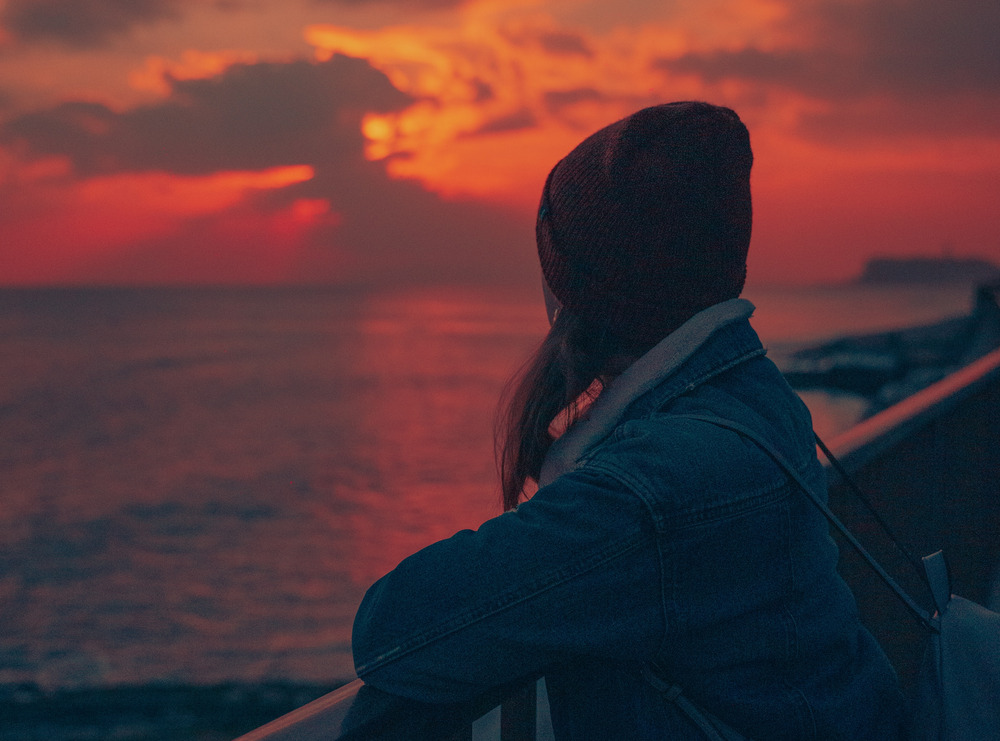Interviews
What Does Accountability Look like in the #MeToo Era?
Jeannie Vanasco interviews her rapist in a memoir that asks hard questions about sexual assault

Note: Masie Cochran is Jeannie Vanasco’s editor for her memoir Things We Didn’t Talk About When I Was a Girl.
“I’ll tell him: I still have nightmares about you,” Jeannie Vanasco writes early in her second memoir, Things We Didn’t Talk About When I Was a Girl. The “him” in question is Mark, a man who was one of Jeannie’s closest friends. But when they were both nineteen, he raped her at a party. Fourteen years later, Jeannie is still asking herself why. With this memoir, she extends the why to Mark—interviewing him on the record about the rape and its aftermath.
When Jeannie and I first talked about her idea for this book, the follow-up to her 2017 memoir The Glass Eye, Trump had recently been elected and the #MeToo movement was building momentum. Both contribute to the story Jeannie tells in this book, as she explores the definition of rape; the ways women are socialized to tend to the comforts of men; the necessity of female support networks; and the many ways in which sexual assault is handled (and mishandled) in our society.
At the center of Jeannie’s book are a series of conversations she has with Mark—first over text and email, then over the phone, and then in person. There are no easy answers, but there is real power in Jeannie’s willingness to ask hard questions and dissect the language of sexual assault, pushing against its confines and unpacking its complicated history.
Masie Cochran: I’d like to start things off with the title, Things We Didn’t Talk About When I Was a Girl. Why do you think it is that we don’t discuss many of the issues you raise in the book? Do you think things have changed at all since you were a young girl?
Jeannie Vanasco: My undergraduates ask me the same questions I asked myself at their age: What counts as sexual assault? Was it bad enough to report? What’s the point of reporting if there’s no proof? And these questions usually come prefaced with “I haven’t told this to anyone else.” I wrote this memoir for a lot of reasons, but mostly I wrote it for my students—when I realized that, in a lot of ways, things have not changed. Men still overwhelmingly wield enormous power. I mean, a bunch of men added Clarence Thomas to the Supreme Court when I was a girl, and now a bunch of men (including two who voted for Thomas) hurriedly made Brett Kavanaugh a Supreme Court justice instead of pursuing a substantive investigation. His nomination arrived after I finished writing this book, as did a white noise machine that I blasted while crying in my campus office as I watched him shout about liking beer.
#MeToo is about empowering and supporting survivors, and holding perpetrators accountable.
But my belief, perhaps head-in-the-clouds, is that some things have changed. Americans definitely seem more interested in talking about sexual assault—more so than when I was a girl. But a lot of us feel silenced when our thoughts and feelings clash with how we’re encouraged to think and feel. For example, the shame that I felt in 2003 when the rape happened and the shame that I felt in 2018 when writing this book made talking about the rape really hard—yet the shame existed for different reasons. In 2003, I felt shame because my behavior conflicted with popular portrayals of the good victim: I’d been drinking that night, I didn’t fight back, I froze. And then in 2018, I felt shame because my thoughts and feelings conflicted with those voiced by #MeToo supporters I admire: I didn’t hate the guy, I didn’t want him locked up, I didn’t even know if I could call what he did rape—and I actually wanted to talk to him, to ask him how the experience had affected him.
MC: As you mentioned above, your memoir dovetails with many concerns raised by the #MeToo movement. What do you think it means to release a book during this particular moment?
JV: #MeToo is about empowering and supporting victims/survivors, and it’s about holding perpetrators accountable. Some of us may disagree about what accountability looks like. But #MeToo is massive enough and sturdy enough to hold different points of view. It’d be pretty weird if every #MeToo supporter agreed with one another about important subjects, such as statute of limitation requirements. Reaching a common goal results from passionate, messy disputes—within a movement—about how that goal can be reached.
And now, having written this book, I’m interested in the different reactions that it will elicit. Not every reader will agree with my approach. And that’s okay. That’s healthy. Though it won’t be healthy for me to comb the internet for reactions—so I’ll probably unplug for a few months and stick to in-person discussions. Mostly, I want readers to come away from my memoir with a deeper understanding of how they consume and interpret someone else’s story of sexual assault.
MC: Your female friends also play a large role in the narrative. How did talking with them enable you to work through this material?
Some of us may disagree about what accountability looks like. But #MeToo is massive enough to hold different points of view.
JV: Their questions and critiques helped me interrogate my own motives and reactions as intensely as I interrogated my rapist’s. They read the transcripts of my conversations with him, and they pointed out instances where he was manipulating me, whether consciously or not. My friends—all strong feminists—also made me feel better about sticking with this project.
MC: You see yourself as a feminist, but worry in the narrative that you might disappoint other feminists. Where you do you think this worry comes from? What do you hope your book might generate in terms of conversations amongst women?
JV: My friends often talk about perpetrators as irredeemable. And statistics point to perpetrators as being repeat offenders. So my friends didn’t think it was a great idea to talk to the guy who raped me. And I understood their rationale. But I wanted to believe—still want to believe—that people are capable of change, or at least capable of remorse.
I hope, too, that the book reaches readers regardless of their gender identity. I hope it helps any victims/survivors who feel guilty about feeling other than how they’re “supposed” to feel or have been taught to feel. And it’d be great if men would read this book and talk about it with other men as well as with teenage boys. This reminds me: I was recently on a plane. I had a notebook on my lap and was staring off into space, and the couple next to me asked if I was a writer. I thought, Oh great. But I told them yes, and then they asked what I write. And we ended up discussing the topic of this book. And the woman was incredibly interested in talking about it. The man seemed interested, but then he said of his partner, “She’s really into #MeToo.” I wish he’d said, We’re really into #MeToo.
MC: Outside of your interviews with Mark, your partner, Chris, offers a male viewpoint. How might the book have been different if not for Chris’ perspective?
JV: Women are conditioned to prioritize the feelings and wellbeing of others. Chris encouraged me to focus on my own feelings. But my female friends also encouraged me to focus on my own feelings. So I’m not sure if Chris’s perspective was particularly gendered.
I wanted to put the focus on my rapist, instead of having readers focus on me, on any perceived unreliability, on what I could have done to prevent or stop the assault.
Chris’s perspective helped, though, because he could offer insight about memories that I’d forgotten. For example, when I began writing the book in January of 2018, I thought that my nightmares about the rape had happened mostly after the last presidential election. But Chris said they’d been happening when he and I started dating in 2009, and would happen every few months after that.
Now this part risks sounding retrograde, like when somebody’s response to a man pushing a stroller is “What a good dad,” but I’ll mention it anyway—in case it inspires other men to step up: while I drafted the book and taught, Chris handled what were otherwise shared domestic responsibilities, such as the laundry, the cooking, the cleaning, the groceries. A telling anecdote: our local grocery store did some remodeling while I was writing the memoir. After I turned in the manuscript, I went to the grocery store and couldn’t find the entrance.
MC: Your first memoir, The Glass Eye, was a consuming memoir that took you more than a decade to write. Both that book and this one address events from your teenage years, but in very different ways. Did you feel you had to write one before the other? Did writing The Glass Eye help you to write this?
JV: The Glass Eye was a deathbed promise to my dad, and writing it became an obsession. Anything else I tried to write transformed into writing about my dad. My grief for him caused me to push aside my feelings about the rape—and about pretty much everything else. I didn’t realize how much the rape had stayed with me.
And after publishing The Glass Eye, which covers my experiences with psychosis, I felt extraordinary pressure to seem reliable in this book—and I hate that that’s the case. But on my tour for The Glass Eye, I was asked about my hallucinations all the time—how did I know that what happened had happened? I didn’t want to go through those kinds of questions again. I wanted to put the focus on my rapist, instead of having readers focus on me, on any perceived unreliability, on what I could have done to prevent or stop the assault. I wanted him on record saying that yes, he knew what he was doing was wrong. I wanted him to confirm my memory of that night. Which is messed up, sure. But as a writer, I’m interested in exploring complicated desires.









